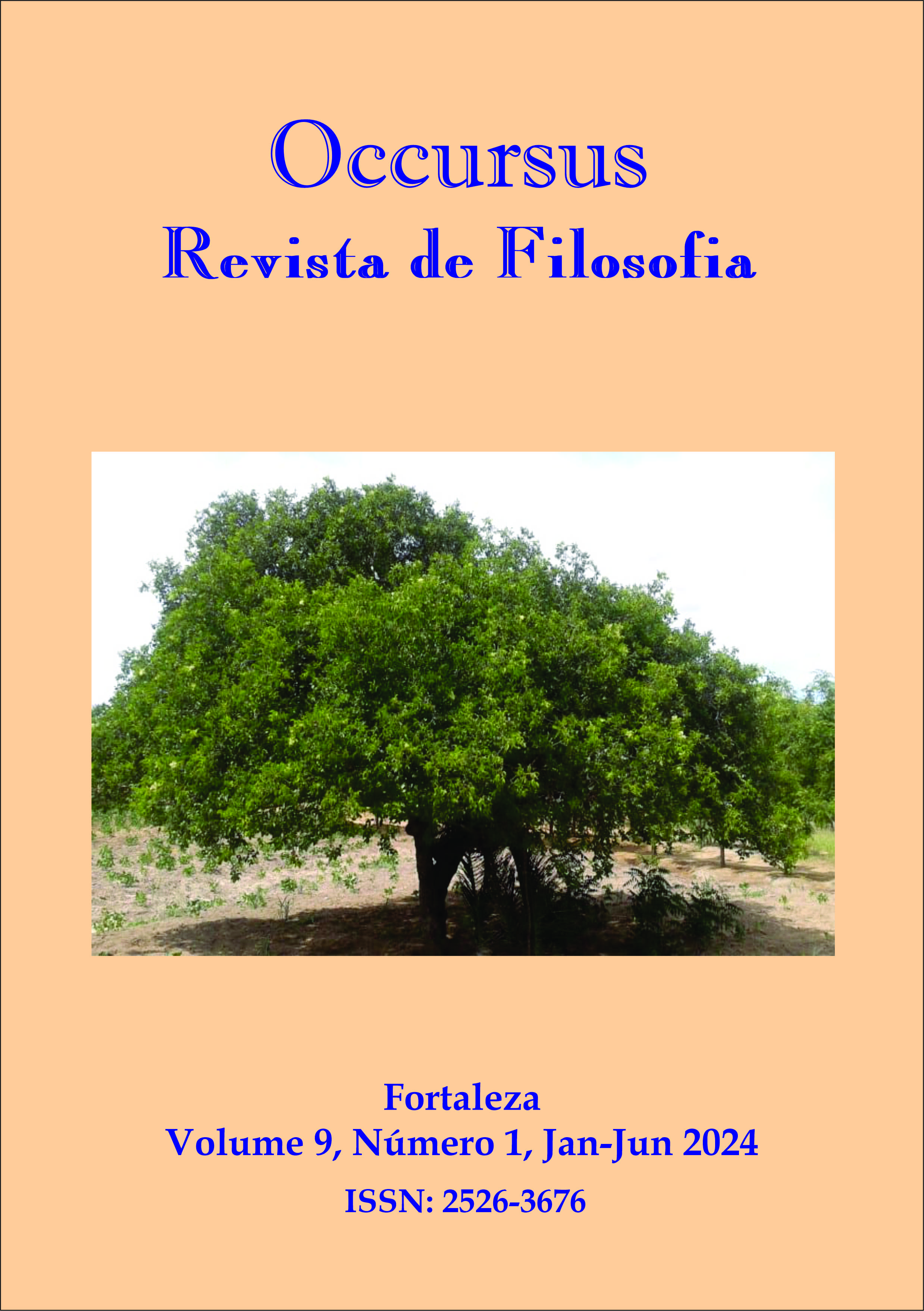O Método hipotético no pensamento platônico
DOI:
https://doi.org/10.52521/occursus.v9i1.12360Palavras-chave:
Platão. Epistemologia. Ciência. Método. Hipótese.Resumo
O presente trabalho tem como objetivo oferecer ao leitor um esboço geral acerca do método hipotético em Platão, mais especificamente nas obras em que o filósofo aborda este método de modo mais detalhado e aprofundando. Não só isso: como também aplica o método hipotético em Platão: o Mênon, o Fédon e, em especial, República. Diz-se ‘‘em especial’’ porque a tratativa acerca desta metodologia de pesquisa se apresenta com uma diferença diante dos outro dois diálogos. A saber, por um lado temos o método hipotético em seu funcionamento próprio, donde vemos nos três diálogos. Por outro lado, temos uma questão sobre qual seja a função do método hipotético para a pesquisa filosófica e para que se entende para a Filosofia enquanto Ciência, donde vemos esta questão sendo mais desenvolvida na República, o qual é onde culminará nossa exposição. Nesse sentido, esse ensaio tem como objetivo oferecer uma abordagem sobre o argumento hipotético de forma que se veja a importância deste método para Platão, ao tratá-lo em suas vantagens e limites lógicos e epistemológicos que lhes é intrínseco, como também se possa fazer enxergar sobre o diálogo direto que filósofo ateniense tinha com as ‘‘matemáticas’’
Referências
ADAM, J· The Republic of Plato. Cambridge: Cambridge University Press, 1963.
ANNAS, J. An Introduction to Plato’s Republic. New York: Oxford University Press, 1981.
ANNAS, J. ‘‘On The Intermediates’’. In: Archiv für Geschichte der Philosophie, vol. 57, pgs. 146-166, 1975.
BOSTOCK, D. Plato’s Phaedo. Oxford: Clarendon Press, 1986.
CONFORD. F. M. The Republic of Plato. Oxford: Clarendon Press, 1941.
DORTER. K. ‘‘The Divided Line and The Structure of Plato’s Republic’’. In: Journal of the History of Philosophy, v. 21, n. 1, p. 1-20, Jan, 2004.
FINE, G. Introduction. In: FINE, G. Plato 1: Metaphysics and Epistemology, ‘‘Introduction’’. Oxford: Oxford University Press, 1999.
FINE, G. Knowledge and Belief in Republic V-VII. In: FINE, G. Plato on Knowledge and Forms. Oxford: Clarendon Press, 2003.
GALLOP, D. Plato Phaedo. Oxford: Oxford University Press. 1975.
JAEGER. W. Paidéia: a formação do homem grego. 3. ed. Tradução de Artur M. Parreira. São Paulo: Martins Fontes, 1994.
PLATÃO. Fédon. 2. ed. Tradução de José Cavalcante de Souza. São Paulo: Abril Cultural, 1983. (Col. Os pensadores).
PLATÃO. Mênon. Trad. de Maura Iglésias. Rio de Janeiro: Ed. PUC Rio; Loyola, 2001.
PLATÃO. Platonis opera. Ed. J. Burnet. Et. Oxford: Oxford Clarendon Press, 1900 – 1909.
PLATÃO. República. 9. ed Tradução de Maria Helena da Rocha Pereira. Lisboa: Fundação Calouste Gulbenkian, 2001.
KAHN, Charles H. Plato And The Socratic Dialogue: The Philosophical Use Of A Literary Form. Cambridge: Cambridge University Press. 1996.
KAHN, Charles H. The Verb ‘Be’ in Ancient Greek. Indianapolis: Hackett Publishing Company, Inc, 2003.
ROBINSON, R. Plato's Earlier Dialectic. New York: Cornell University Press, 1941.
ROWETT, C. Knowledge And Truth in Plato: Stepping Past The Shadow of Socrates. Oxford: Oxford Clarendon Press: 2018.
SCOTT, D. Levels of Argument: A Comparative Study of Plato’s Republic and Aristotle’s Nicomachean Ethics. New York: Oxford University Press, 2015
SCOTT, D. Plato’s Meno. Cambridge: Cambridge University Press, 2005.
VLASTOS, G. Reasons and Causes. In: VLASTOS, G. Platonic Studies. Princeton: Princeton University Press, 1973.
Downloads
Publicado
Como Citar
Edição
Seção
Licença
Copyright (c) 1969 Francisco Gabriel Marques de Almeida Caroba

Este trabalho está licenciado sob uma licença Creative Commons Attribution 4.0 International License.




